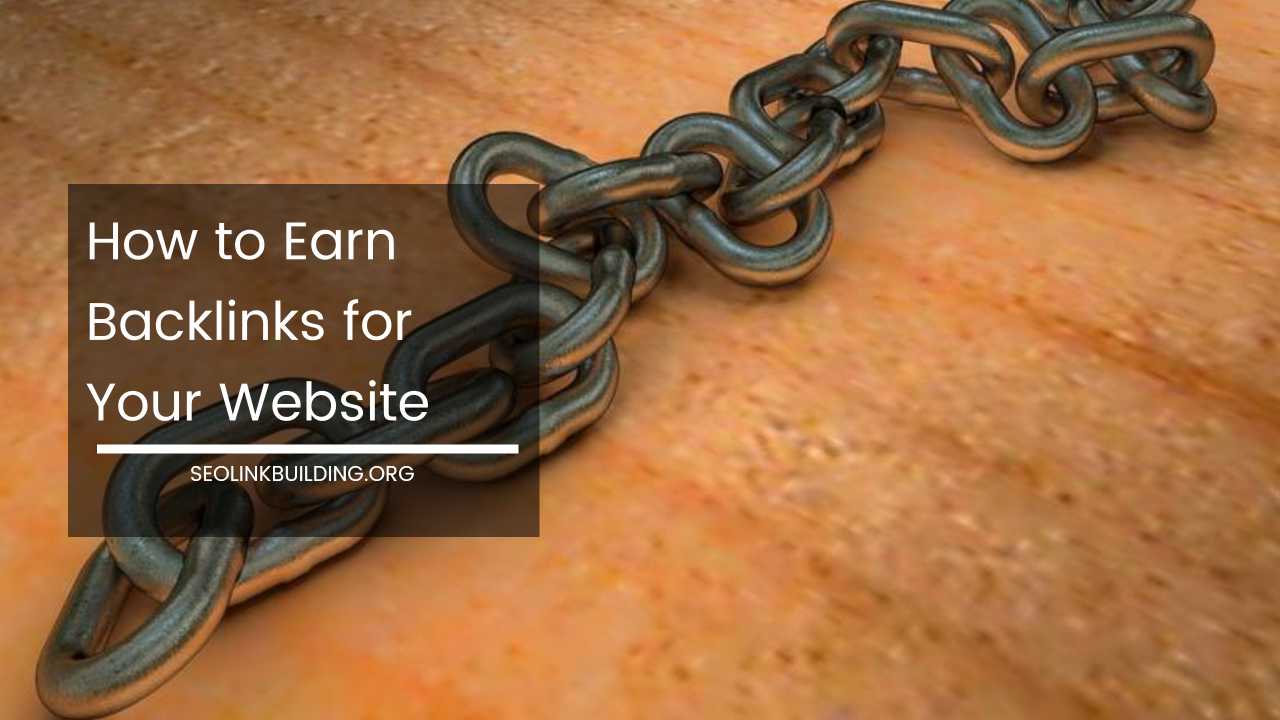How to Earn Backlinks for Your Website

How To Earn Backlinks For Your Website: The Backbone of High SEO
In the competitive world of SEO, backlinks reign supreme. These links from other websites act as votes of confidence, telling search engines your website is valuable and trustworthy.
The more high-quality backlinks you possess, the higher your website climbs the search engine rankings ladder. But acquiring these coveted backlinks can feel like a daunting task.
Fear not! This comprehensive guide equips you with effective strategies to attract high-quality backlinks and strengthen your website’s SEO foundation.
Understanding Backlinks and Their Importance
Imagine backlinks as citations in the academic world. The more credible sources cite your research, the more established you become in your field.
Similarly, backlinks from authoritative websites signal to search engines that your website deserves recognition. Backlinks influence SEO in several ways:
- Increased Website Authority: Search engines consider the quality and quantity of backlinks when ranking websites. Backlinks from high-authority websites pass on “link juice,” boosting your own website’s authority and ranking potential.
- Improved Search Visibility: Backlinks act as discovery pathways. When other websites link to yours, they’re essentially directing their audience to your content, increasing your website’s visibility in search results.
- Enhanced Brand Awareness: Backlinks expose your website to a wider audience, potentially leading to brand recognition and increased website traffic.
Earning Backlinks: Strategies for Success
Building a strong backlink profile requires a strategic approach. Here are some effective methods to secure valuable backlinks:
- Content is King: Create Link-Worthy Content
The cornerstone of any successful backlink strategy is exceptional content. Develop informative, engaging, and valuable content that establishes you as a thought leader in your niche. Here are some content formats that naturally attract backlinks:
- Ultimate Guides: Compile comprehensive guides that address a topic in-depth, providing valuable insights and resources.
- Industry Reports: Conduct original research and present it in a compelling report format. Consider including visualizations like charts and graphs to enhance user experience.
- Infographics: Create visually appealing infographics that condense complex information into easily digestible visuals. Share infographics on social media platforms and relevant online communities to increase their visibility.
- Listicles: Curate well-researched listicles that offer valuable resources or insights within your niche. Ensure your listicles go beyond basic information and provide unique value to readers.
- Guest Blogging: Share Your Expertise
Become a guest blogger for websites within your industry. Contribute high-quality articles that showcase your expertise and provide value to the target audience. Here are some additional tips for successful guest blogging:
- Target Relevant Websites: Research websites with a high domain authority (DA) and audience relevant to your niche. Many websites have “write for us” sections on their website.
- Craft Compelling Pitches: Tailor your guest post pitches to each website, highlighting how your content aligns with their audience’s interests. Showcase your expertise and provide a clear outline of your proposed article.
- Optimize Guest Posts for Backlinks: Include a natural backlink to your website in your author bio. Ensure the anchor text (the clickable text) is relevant to your content and website.
- Broken Link Building: A Win-Win Situation
Identify broken links on websites relevant to your niche. Tools like Ahrefs or SEMrush can help with this process.
Reach out to the webmaster and suggest your relevant content as a replacement for the broken link. This benefits both parties: you earn a backlink, and they improve their website’s user experience. Here are some additional considerations for broken link building:
- Focus on High-Quality Links: Prioritize websites with high domain authority and ensure the broken link is topically relevant to the content you’re suggesting as a replacement.
- Personalize Your Outreach: Avoid generic emails. Briefly introduce yourself, explain the broken link you found, and suggest your high-quality content as a valuable replacement.
- Become a Source for Reporters and Journalists
Many journalists and reporters rely on expert sources for their stories. Utilize platforms like HARO (Help A Reporter Out) to connect with journalists seeking information in your field.
By providing valuable insights and being quoted in their articles, you can secure backlinks to reputable news websites. Here’s how to optimize your HARO profile for success:
- Clearly Define Your Expertise: Create a detailed profile on HARO that accurately reflects your areas of expertise.
- Respond Promptly: Journalists often work on tight deadlines. Respond to relevant HARO queries quickly and provide well-researched and concise answers.
- Build Relationships: Over time, you may develop relationships with journalists who frequently reach out to HARO for expertise. This can lead to recurring opportunities for backlinks.
- Leverage Social Media for Promotion
Promote your high-quality content on social media platforms like Twitter, LinkedIn, and Facebook. Share engaging snippets of your content alongside the link to your website.
When people share your content, it increases its visibility and can potentially lead to backlinks from other websites that find your content valuable. Here are some additional tips for social media promotion:
- Utilize Relevant Hashtags: Include relevant hashtags in your social media posts to increase discoverability. Research trending hashtags within your niche and use them strategically.
- Engage with Your Audience: Respond to comments and questions on your social media posts. Foster a community around your content and encourage interaction.
- Build Relationships with Industry Influencers:
Connect with influencers within your niche. Influencers can be bloggers, industry leaders, or social media personalities with a dedicated following. Here are some ways to build relationships with influencers:
- Participate in Online Discussions: Engage in relevant online discussions on forums or social media groups. Share your expertise and insights to establish yourself as a thought leader.
- Collaborate on Content Creation: Collaborate with influencers on co-creating content, such as guest blog posts, infographics, or webinars. This leverages both your audiences and can lead to backlinks on the influencer’s website.
- Offer Guest Appearances: If you host a podcast or webinar, consider inviting influencers as guests. This provides valuable content for your audience and establishes a connection with the influencer.
- Turn Brand Mentions into Backlinks:
Monitor brand mentions online using tools like Google Alerts or Mention. If someone mentions your brand without linking to your website, reach out politely and request a backlink. Here’s how to approach brand mentions effectively:
- Personalize Your Outreach: Craft personalized messages acknowledging the brand mention and expressing your appreciation. Briefly explain why a backlink to your website would be valuable for their readers.
- Provide Value: If appropriate, offer to provide additional information or resources relevant to the brand mention. This demonstrates your expertise and increases the chances of securing a backlink.
- Claim Industry Awards and Recognitions
Winning industry awards or being recognized for your work can be a great source of backlinks. Proudly display these recognitions on your website and encourage award organizers to link back to your website. Here are some additional tips for leveraging awards and recognitions:
- Promote Your Achievements: Share news of your awards and recognitions on social media and in press releases. This increases brand awareness and can attract backlinks from news websites or industry publications.
- Network with Award Organizers: Build relationships with award organizers. This can lead to future opportunities for collaboration or guest blogging on their platforms.
Building High-Quality Backlinks: Focus on Quality, Not Quantity
Not all backlinks are created equal. Focus on acquiring backlinks from high-quality, relevant websites within your niche. Backlinks from spammy or low-authority websites can hurt your SEO ranking. Here are some factors to consider when evaluating backlink quality:
- Domain Authority (DA): A metric that predicts a website’s ranking potential. Backlinks from high-DA websites are more valuable. You can use tools like Moz or Ahrefs to check the DA of a website.
- Website Relevance: The website linking to yours should be topically relevant to your niche. A backlink from a website selling gardening equipment wouldn’t be as valuable for a website about web design.
- Link Placement: Backlinks placed within the main content carry more weight than those placed in the sidebar or footer. Backlinks within the main content suggest a more editorial endorsement of your website.
Final Thoughts: Building Backlinks is a Continuous Process
Earning backlinks is a long-term strategy. Implement these tactics consistently, create high-quality content, and build relationships within your niche.
Monitor your backlink profile using tools like Google Search Console to track your progress. Remember, SEO is a dynamic field, so stay updated on the latest trends and adapt your backlink building strategies accordingly.
By following these steps, you can create a strong backlink profile that propels your website to the top of search engine results pages.













